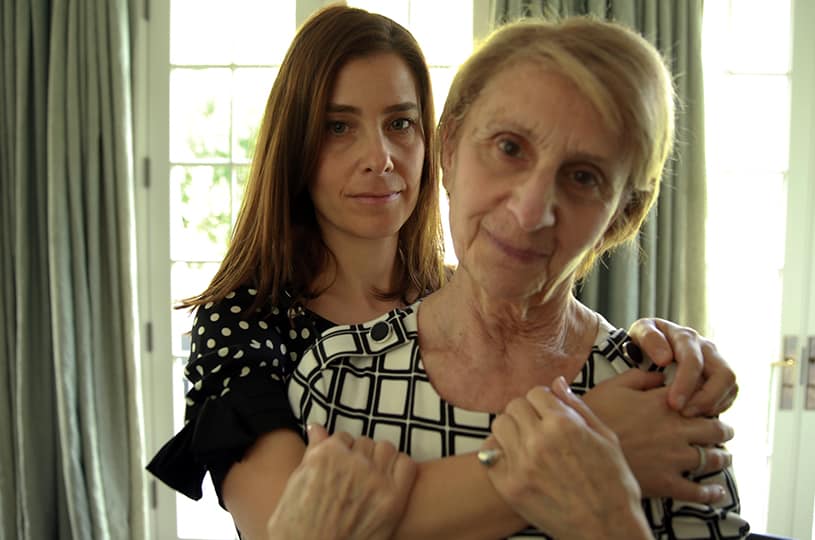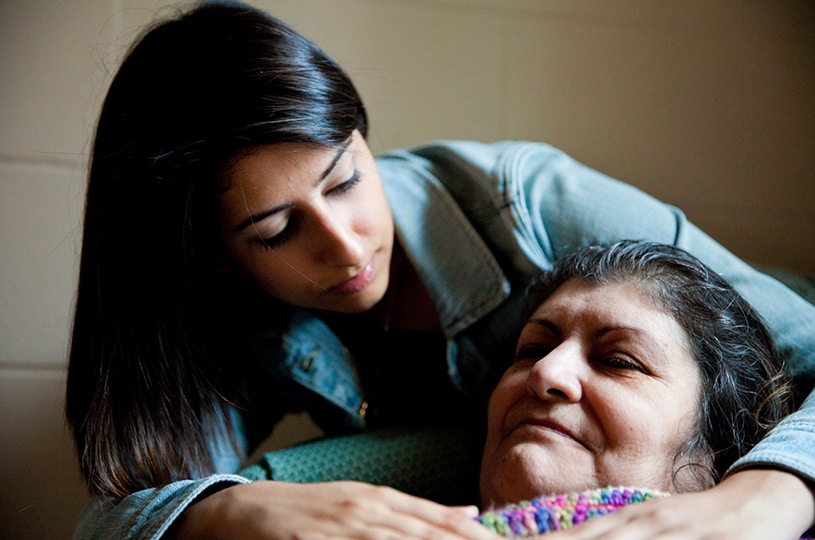Caring for loved ones often falls on women – especially the so-called sandwich generation – who must balance caring for older parents as well as their own children. As the baby boomers age, many of us will find ourselves thrust into a caregiver role, whether we are ready or not.
In her new documentary, The Caregivers Club (airing on CBC January 14th at 9:00pm), filmmaker Cynthia Banks takes us inside the lives of three families affected by dementia. The film follows Domenic, Karen and Barbara as they each take care of a spouse or parent who can no longer take care of themselves. Their stories unfold over a one-year period as they navigate the erratic stages of this cruel and relentless disease.
We spoke with Cynthia about why she made the film, and what we need to do to face this looming crisis.
SDTC: What inspired you to make this film?
CB: My mom was the caregiver to my dad. He passed away in March 2016 so this documentary came out of that experience. This whole experience has been a lesson in how imperfect I still am, because when she was in the midst of the difficult times, I was actually hard on her – because it was my dad. It was my knight in shining armour, and she was impatient and angry and upset all the time. And it was all about making him comfortable. You just don’t realize unless, you’re there twenty-four hours a day, the toll it takes.
I empathized more with the characters in the documentary than with my own mother. It started weighing on me. I started thinking, Why do you have empathy for them but you had none when you went through it with your mom? It taught me that I had amends to make.
What did you say to her?
It was on Thanksgiving and we were on a walk in a beautiful forest. I just started crying. I said, “You deserved so much more praise and thanks when you were with my dad. I want to thank you from the bottom of my heart.” We both hugged and cried. She didn’t really say anything. I think she appreciated it. At that conversation, I told her the film is dedicated to her.
What really stood out to you throughout this process?
We are at the tipping point of a crisis. Caregivers don’t have enough support in their homes. The community care aspect needs to be really established. There are different phases of dementia. For one small phase you can take your loved one to a day program or you can get them to do activities. But that’s only one phase. Most of the phases take place at home and they cannot go anywhere. People are in such crisis that they would ask me to take their wife to the washroom for them, just this once.
In the current system, there is no established time and schedule that caregivers can get people in to help them. If you want to get your husband up and showered and out by 7 o’ clock – to try and maintain some sort of daily schedule – you cannot book someone for that time. They will come whenever they can get there. A lot of times they will cancel last minute, so you don’t have any of that help. We need to train and pay personal support workers. They are so underpaid and under-trained it blows my mind. There is something wrong here. They have the most difficult job and no one is paying attention to that right now.

Barb Schechter with her mother, Donna
Which characters in your documentary resonated with you personally?
Every day I think of what they’re going through. I can’t let them go. The one I connected to most was Barb, because she is going through it with a parent, and that’s what I did. The others are spouses. I think I compared my mom to them. Barb and I cried together; that’s how difficult it is to watch your parent – who you’ve always looked up to – just crumble while trying to juggle everything. I had to juggle too; I’m a single mom, and I have this career, so you want to try and help as much as you can and also do some self care.
It’s that balance thing – when are you going to burn out? That’s the problem with women in this sandwich generation especially; the burnout is going to start happening. Who is going to pay for it? I don’t get benefits. If I crash, I lose my house. We’re the ones who are trying to take care of everybody.
What gives you hope?
I am going to take this film across the country and get the conversation about caregivers going – this is a crisis and we need to help them. I want to use this as a fundraiser and turn it into a grant for people who are stuck at home – they can get some help for four hours so they can go for a walk, or shop. Just a little break during the day can make a big difference to keep our families together. It will simply pay for some extra private care once a week for families that are financially in need. It’s the only thing I can do.
What did you learn in making this documentary?
It was a reminder in perseverance, and in the importance of taking care of yourself. The caregivers did that way better than I think my mom did. They saw that they needed to talk things through and maintain their balance, or they weren’t going to be good for anyone. I come from a family where we just soldier on, we don’t really talk a lot, we just do what we need to do. They opened up and it benefited them.



 Follow Us On Instagram
Follow Us On Instagram



 We’ve gathered
We’ve gathered 
 We’re giving aw
We’re giving aw